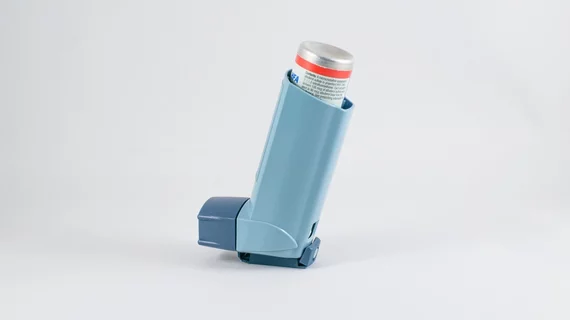Experts identify biomarker of severe asthma on MRI
Experts have identified a new MRI biomarker that could help improve the management of severe asthma, according to new work published Tuesday in Insights Into Imaging.
Researchers analyzed the use of quantitative T2 signal bronchial intensity to differentiate severe from non-severe asthma to determine if it could be used to identify patients in need of more potent treatment. Their findings revealed the biomarker to be associated with other measures of pulmonary function in patients with more severe cases.
Experts are hopeful that their findings could improve providers’ decision-making when it comes to their patients’ treatment options.
“Severe asthma represents 3 to 5% of all asthmatic patients but causes around 60% of the disease costs,” Ilyes Benlala, MD, of the University Bordeaux in France, and colleagues noted. “Patients with severe asthma are known to be prone to severe exacerbations with a need for hospital admission, in addition to biologic medications, both leading to an increase in the economic burden of asthma management in the healthcare system.”
For the study, researchers analyzed imaging findings between patients diagnosed with severe asthma and a group of age- and sex-matched controls with non-severe asthma. The team measured the mean T2 intensity MRI signal of the bronchial wall area (BrWall_T2-MIS) of both sets of patients and compared those findings alongside pulmonary function tests (PFTs), fractional exhaled nitric oxide and blood eosinophils count.
The BrWall_T2-MIS was higher in patients with severe asthma compared to the control group. This finding was also found to be correlated with lower performance on PFTs, while blood eosinophils were moderately in agreement with BrWall_T2-MIS. The group found the metric to be highly reproducible in differentiating severe from non-severe asthma, suggesting it "could be considered a new imaging biomarker.”
“Our results suggest that bronchial T2 signal is related to both asthma severity and inflammatory mechanisms. Indeed, we found a positive correlation between BrWall_T2-MIS and blood eosinophils, a well-known biomarker of airway inflammation, in severe asthmatic patients,” the authors explained. “Thus, the use of MRI as an imaging biomarker of inflammation in asthma could play an essential role in the management of severe asthma, especially in the era of biotherapies.”
The authors acknowledged that their findings are limited by the study’s small sample size. However, if further validated in larger cohorts, they are optimistic that their results could be used to improve asthma therapies.
Learn more about the findings here.

